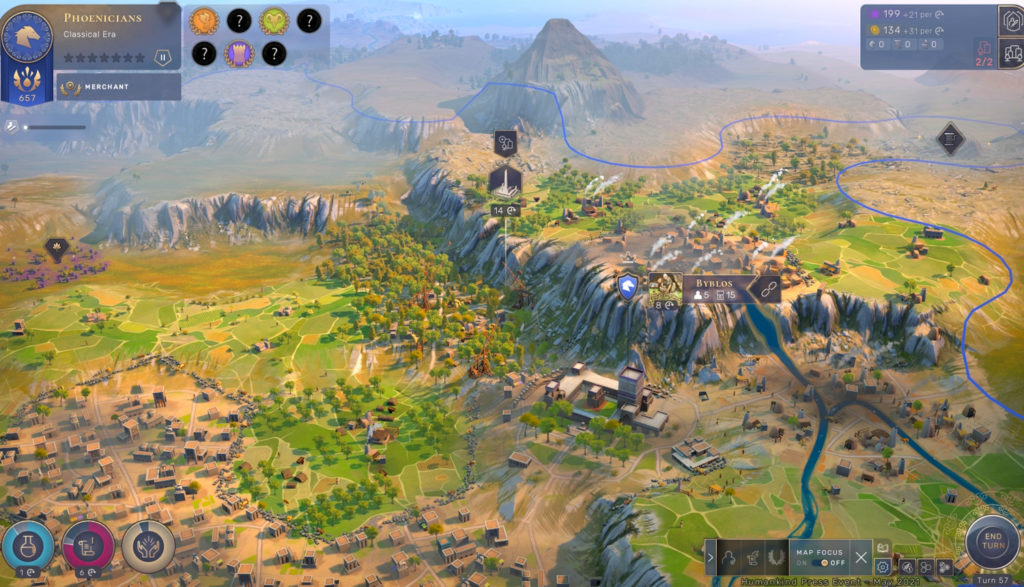
The new game Humankind is a real-time, turn-based strategy title that falls under the 4X subgenre (an abbreviation for Explore, Expand, Exploit and Exterminate). As such, it tasks gamers with building their own nation and culture through the course of six historic eras. The end goal is to compete against up to nine other AI- or human-controlled civilizations and earn the most “Fame” points through the development of your nation, your scientific advancement and the cultural influence your civ has on the rest of the collective world.
Much like the popular Civilization games, this cerebral contestlets players start with humanity’s basic building blocks and then find a way to grow and to become a dominant world powerhouse.
Humankind throws in several new twists, however.
First, all players (again, either AI or online multiplayer humans) start off as individual hunter-gatherer tribes wandering the hillsides in the Neolithic Era. It’s a neutral starting point that every player shares. Then you move on into the Ancient Era by either gathering enough food or discovering enough remnants of science to become a more settled society. After that you grow by producing food, science, manufacturing and money.
That transition into the Ancient Era is also when your blossoming empire earns its first culture. And each culture has its own affinity that will help you develop further. If you choose the Egyptians, for instance, you gain more Industry boosts to get those important city structures erected. The Harrapans grow food more abundantly and help your population grow. The Hittites gain combat boosts and can feed your lust for war, etc.
A big shift here, though, is the ability to choose a new culture with each new era reached. So, you might start out as the battle-focused Hittites, but in the Classical Era your civilization can evolve into a Greek society with a newfound thirst for science. That may not seem perfectly logical, but the shifting cultures allow you to emphasize different play styles as you progress, giving you the flexibility to change tack as new circumstances arise in the world around you. Your civ also carries over certain legacy bonuses so that the effects of your previous cultural choices continue to aid you in the future.
In addition, there are two important resources to keep track of in Humankind. “Influence” impacts how much you can spread your culture to neighboring civs and cities and thereby expand externally. (In some cases resulting in the assimilation of neighboring cities.) And “Stability” is a measurement of the attitudes of your populace—since a sprawling society is tough to govern and keep happy—and it determines how much you can grow internally.
Humankind plays out as a compelling combination of strategic choices and actions that keeps players thinking and involved. And though the cultural “melting pot” approach can seem strange—since it’s hard to fathom the Greeks evolving into, say, the Japanese in the course of a few eras—it’s still an interesting gameplay device that adds fun challenges and bonuses as you play.
The game also spurs younger gamers to think through the ways that nations change and grow. Producing housing, industry, food, science and wealth are all things to concentrate on and keep in balance. And it teaches players that growing societies are often shaped by an ever-changing influx of cultures and people.
Like all 4X games, there’s the “exterminate” side of the equation to consider. There are going to be battles with other groups, and some nations are naturally very aggressive. But the battles—which range from bows and arrows, to mounted knights, to riflemen, to tanks and bombers—are never messy or bloody (though they do involve war cries and explosions).
Further, the Entertainment Software Ratings Board, notes that the words “d–n” and “h—” can pop up in the written dialogue. But I never encountered them. Their usage is infrequent enough, apparently, that the game still earned an E10+ rating.
Humankind is a fun and generally intuitive strategy game with only a few minor gameplay weaknesses (such as a currently underdeveloped religion system). The biggest drawback for parents to note is that the game—with its different menu layers and ongoing cultural changes—might be a bit complicated for young beginning players.

After spending more than two decades touring, directing, writing and producing for Christian theater and radio (most recently for Adventures in Odyssey, which he still contributes to), Bob joined the Plugged In staff to help us focus more heavily on video games. He is also one of our primary movie reviewers.